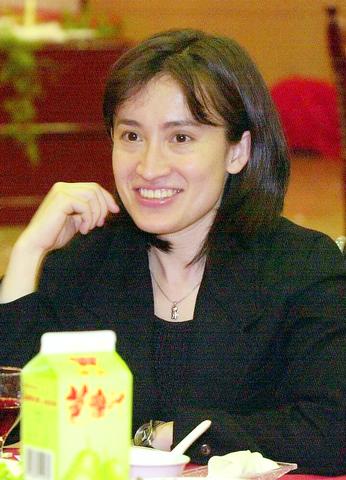Hsiao Bi-khim (
Hsiao said that if elected as a legislator, her dream to work for Taiwan would be fulfilled, and that the nation would benefit from her expertise in foreign relations.

PHOTO: TAIPEI TIMES
"Through my education and growing experience ... I have established the groundwork for my choice to work in the political arena in Taiwan," Hsiao said at Tainan Theological College and Seminary (台南神學院), where her father served as the school's president.
"I chose to come back to my home city of Tainan to announce a very crucial personal decision -- that is, to join the DPP primary in a bid to run for a seat representing overseas Chinese communities."
Hsiao has been a focus of media attention over recent months after allegations surfaced in November that she and the president were having an affair.
Subsequently, she was attacked by opposition lawmakers for holding a post at the Presidential Office and at the same time retaining dual citizenship. At yesterday's press conference, she said she felt frustrated at these recent incidents and had thought of withdrawing from her career in politics.
"I take my work very seriously, but I did not expect that my low-key job as a presidential aide would draw such ferocious attacks from the opposition. Facing the storms of criticism, I thought of dropping out of politics," she said.
"But in retrospect, I know what we enjoy today is the result of the painstaking efforts made by our senior politicians.
"Now I feel I should not give up, and instead should take more concrete actions to fulfill my ideas to serve my country."
Having worked at the DPP's Department of International Affairs she currently is employed as an advisor to the president on diplomatic policy.
Hsiao said she has gradually proved her capabilities in dealing with international relations, and now thinks that helping the government win a greater standing in the international community is one of her key goals.
The DPP's Chiu I-jen (
Chiu said he appreciated her professional skills in diplomacy and hoped that Hsiao could find new ways to broaden Taiwan's international relations.

DAREDEVIL: Honnold said it had always been a dream of his to climb Taipei 101, while a Netflix producer said the skyscraper was ‘a real icon of this country’ US climber Alex Honnold yesterday took on Taiwan’s tallest building, becoming the first person to scale Taipei 101 without a rope, harness or safety net. Hundreds of spectators gathered at the base of the 101-story skyscraper to watch Honnold, 40, embark on his daredevil feat, which was also broadcast live on Netflix. Dressed in a red T-shirt and yellow custom-made climbing shoes, Honnold swiftly moved up the southeast face of the glass and steel building. At one point, he stepped onto a platform midway up to wave down at fans and onlookers who were taking photos. People watching from inside

A Vietnamese migrant worker yesterday won NT$12 million (US$379,627) on a Lunar New Year scratch card in Kaohsiung as part of Taiwan Lottery Co’s (台灣彩券) “NT$12 Million Grand Fortune” (1200萬大吉利) game. The man was the first top-prize winner of the new game launched on Jan. 6 to mark the Lunar New Year. Three Vietnamese migrant workers visited a Taiwan Lottery shop on Xinyue Street in Kaohsiung’s Gangshan District (崗山), a store representative said. The player bought multiple tickets and, after winning nothing, held the final lottery ticket in one hand and rubbed the store’s statue of the Maitreya Buddha’s belly with the other,

‘NATO-PLUS’: ‘Our strategic partners in the Indo-Pacific are facing increasing aggression by the Chinese Communist Party,’ US Representative Rob Wittman said The US House of Representatives on Monday released its version of the Consolidated Appropriations Act, which includes US$1.15 billion to support security cooperation with Taiwan. The omnibus act, covering US$1.2 trillion of spending, allocates US$1 billion for the Taiwan Security Cooperation Initiative, as well as US$150 million for the replacement of defense articles and reimbursement of defense services provided to Taiwan. The fund allocations were based on the US National Defense Authorization Act for fiscal 2026 that was passed by the US Congress last month and authorized up to US$1 billion to the US Defense Security Cooperation Agency in support of the

HIGH-TECH DEAL: Chipmakers that expand in the US would be able to import up to 2.5 times their new capacity with no extra tariffs during an approved construction period Taiwan aims to build a “democratic” high-tech supply chain with the US and form a strategic artificial intelligence (AI) partnership under the new tariffs deal it sealed with Washington last week, Taipei’s top negotiator in the talks said yesterday. US President Donald Trump has pushed Taiwan, a major producer of semiconductors which runs a large trade surplus with the US, to invest more in the US, specifically in chips that power AI. Under the terms of the long-negotiated deal, chipmakers such as Taiwan Semiconductor Manufacturing Co (TSMC, 台積電) that expand US production would incur a lower tariff on semiconductors or related manufacturing